英语自考现代语言学简答题
- 格式:doc
- 大小:76.50 KB
- 文档页数:5
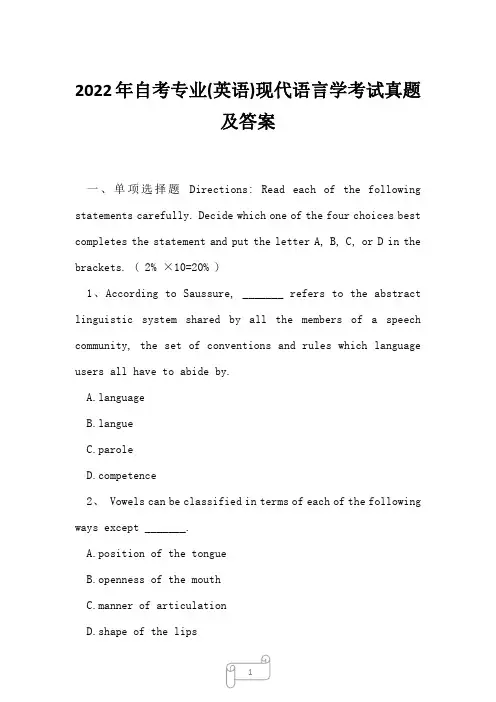
2022年自考专业(英语)现代语言学考试真题及答案一、单项选择题Directions: Read each of the following statements carefully. Decide which one of the four choices best completes the statement and put the letter A, B, C, or D in the brackets. ( 2% ×10=20% )1、According to Saussure, _______ refers to the abstract linguistic system shared by all the members of a speech community, the set of conventions and rules which language users all have to abide by.nguagengueC.parolepetence2、 Vowels can be classified in terms of each of the following ways except _______.A.position of the tongueB.openness of the mouthC.manner of articulationD.shape of the lips3、There are _______ morphemes in the word “frightening.”A.2B.3C.4D.54、A speaker’s knowledge o f his/her native language which is internalized in the mind of the speaker is not a complete list of words and phrases, but _______ of grammatical knowledge.A.a rule systemB.phrase structure rulesC.movement rulesD.transformational rules5、 Predication analysis is a way to analyze _______ meaning.A.wordB.utteranceC.phraseD.sentence6、Speaker A: I’m out of petrol.Speaker B: There’s a garage round the corner.Speaker B is violating the maxim of _______.A.quantityB.qualityC.relationD.manner7、_______, vowels tend to be nasalized before nasal consonants because it is difficult to time the lowering of the velum to produce nasality with the consonant articulation.A.PsychologicallyB.SociologicallyC.CulturallyD.Physiologically8、 A typical example of a _______ community is an ethnic ghetto where most, if not all, of its inhabitants are either immigrants or children of immigrants.A.diglossicB.bilingualC.pidginizedD.creolized9、 Which of the following mental functions is NOT under the control of the right hemisphere in most people?A.Holistic reasoningB.Temporal orderingC.Visual and spatial skillsD.Recognition of patterns10、Which of the following choices CANNOT be considered asindividual learner factors affecting the acquisition of a second language?A.AptitudeB.MotivationC.InterferenceD.Personality参考答案:【一、单项选择题】1~5BCBAD6~10CDBB。
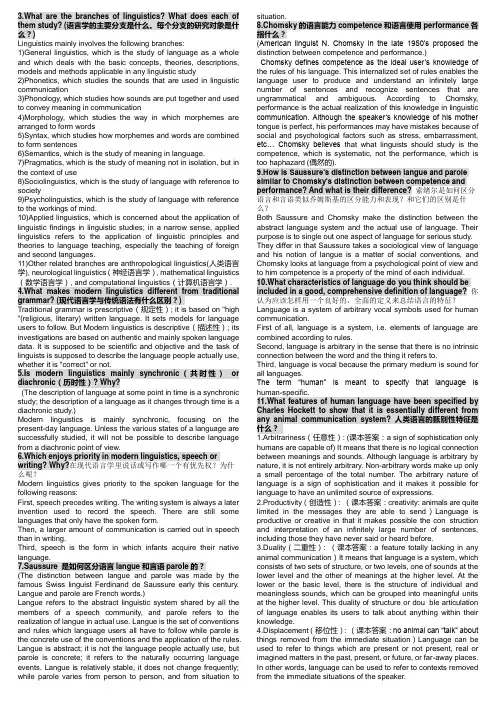
3.What are the branches of linguistics? What does each of them study? (语言学的主要分支是什么。
每个分支的研究对象是什么?)Linguistics mainly involves the following branches:1)General linguistics, which is the study of language as a whole and which deals with the basic concepts, theories, descriptions, models and methods applicable in any linguistic study2)Phonetics, which studies the sounds that are used in linguistic communication3)Phonology, which studies how sounds are put together and used to convey meaning in communication4)Morphology, which studies the way in which morphemes are arranged to form words5)Syntax, which studies how morphemes and words are combined to form sentences6)Semantics, which is the study of meaning in language.7)Pragmatics, which is the study of meaning not in isolation, but in the context of use8)Sociolinguistics, which is the study of language with reference to society9)Psycholinguistics, which is the study of language with reference to the workings of mind.10)Applied linguistics, which is concerned about the application of linguistic findings in linguistic studies; in a narrow sense, applied linguistics refers to the application of linguistic principles and theories to language teaching, especially the teaching of foreign and second languages.11)Other related branches are anthropological linguistics(人类语言学), neurological linguistics(神经语言学), mathematical linguistics (数学语言学), and computational linguistics(计算机语言学).4.What makes modern linguistics different from traditional grammar? (现代语言学与传统语法有什么区别?)Traditional grammar is prescriptive(规定性); it is based on "high "(religious, literary) written language. It sets models for language users to follow. But Modern linguistics is descriptive(描述性); its investigations are based on authentic and mainly spoken language data. It is supposed to be scientific and objective and the task of linguists is supposed to describe the language people actually use, whether it is "correct" or not.5.Is modern linguistics mainly synchronic(共时性)or diachronic(历时性)? Why?(The description of language at some point in time is a synchronic study; the description of a language as it changes through time is a diachronic study.)Modern linguistics is mainly synchronic, focusing on the present-day language. Unless the various states of a language are successfully studied, it will not be possible to describe language from a diachronic point of view.6.Which enjoys priority in modern linguistics, speech or writing? Why?在现代语言学里说话或写作哪一个有优先权?为什么呢?Modern linguistics gives priority to the spoken language for the following reasons:First, speech precedes writing. The writing system is always a later invention used to record the speech. There are still some languages that only have the spoken form.Then, a larger amount of communication is carried out in speech than in writing.Third, speech is the form in which infants acquire their native language.7.Saussure 是如何区分语言langue和言语parole的?(The distinction between langue and parole was made by the famous Swiss linguist Ferdinand de Saussure early this century. Langue and parole are French words.)Langue refers to the abstract linguistic system shared by all the members of a speech community, and parole refers to the realization of langue in actual use. Langue is the set of conventions and rules which language users all have to follow while parole is the concrete use of the conventions and the application of the rules. Langue is abstract; it is not the language people actually use, but parole is concrete; it refers to the naturally occurring language events. Langue is relatively stable, it does not change frequently; while parole varies from person to person, and from situation to situation.8.Chomsky的语言能力competence和语言使用performance各指什么?(American linguist N. Chomsky in the late 1950’s proposed the distinction between competence and performance.)Chomsky defines competence as the ideal user’s knowledge of the rules of his language. This internalized set of rules enables the language user to produce and understand an infinitely large number of sentences and recognize sentences that are ungrammatical and ambiguous. According to Chomsky, performance is the actual realization of this knowledge in linguistic communication. Although the speaker’s knowledge of his mother tongue is perfect, his performances may have mistakes because of social and psychological factors such as stress, embarrassment, etc… Chomsky believes that what linguists should study is the competence, which is systematic, not the performance, which is too haphazard (偶然的).9.How is Saussure’s distinction between langue and parole similar to Chomsky’s distinction between competence and performance? And what is their difference?索绪尔是如何区分语言和言语类似乔姆斯基的区分能力和表现?和它们的区别是什么?Both Saussure and Chomsky make the distinction between the abstract language system and the actual use of language. Their purpose is to single out one aspect of language for serious study. They differ in that Saussure takes a sociological view of language and his notion of langue is a matter of social conventions, and Chomsky looks at language from a psychological point of view and to him competence is a property of the mind of each individual. 10.What characteristics of language do you think should be included in a good, comprehensive definition of language?你认为应该怎样用一个良好的,全面的定义来总结语言的特征?Language is a system of arbitrary vocal symbols used for human communication.First of all, language is a system, i.e. elements of language are combined according to rules.Second, language is arbitrary in the sense that there is no intrinsic connection between the word and the thing it refers to.Third, language is vocal because the primary medium is sound for all languages.The term “human” is meant to specify that language is human-specific.11.What features of human language have been specified by Charles Hockett to show that it is essentially different from any animal communication system? 人类语言的甄别性特征是什么?1.Arbitrariness(任意性): (课本答案:a sign of sophistication only humans are capable of) It means that there is no logical connection between meanings and sounds. Although language is arbitrary by nature, it is not entirely arbitrary. Non-arbitrary words make up only a small percentage of the total number. The arbitrary nature of language is a sign of sophistication and it makes it possible for language to have an unlimited source of expressions.2.Productivity(创造性): (课本答案:creativity: animals are quite limited in the messages they are able to send)Language is productive or creative in that it makes possible the con¬struction and interpretation of an infinitely large number of sentences, including those they have never said or heard before.3.Duality(二重性): (课本答案:a feature totally lacking in any animal communication)It means that language is a system, which consists of two sets of structure, or two levels, one of sounds at the lower level and the other of meanings at the higher level. At the lower or the basic level, there is the structure of individual and meaningless sounds, which can be grouped into meaningful units at the higher level. This duality of structure or dou¬ble articulation of language enables its users to talk about anything within their knowledge.4.Displacement(移位性): (课本答案:no animal can “talk” about things removed from the immediate situation)Language can be used to refer to things which are present or not present, real or imagined matters in the past, present, or future, or far-away places. In other words, language can be used to refer to contexts removed from the immediate situations of the speaker.5. Cultural transmission(文化传递性):(课本答案:details of human language system are taught and learned while animals are born with the capacity to send out certain signals as a means of limited communication)While we are born with the ability to acquire language, the details of any language are not genetically transmitted, but instead have to be taught and learned.12.Do you think human language is entirely arbitrary? Why?人类的语言是否是完全任意的?为什么?Language is arbitrary in nature, it is not entirely arbitrary, because there are a limited number of words whose connections between forms and meanings can be logically explained to a certain extent, for example, the onomatopoeia, words which are coined on the basis of imitation of sounds by sounds such as bang, crash, etc.. Take compounds for another example. The two elements “photo” and “copy” in “photocopy” are non-motivated, but the compound is not arbitrary.2.What are the two major media of communication? Of the two, which one is primary and why? 语言交际的两大媒介是什么?哪一个是基本的交际媒介?为什么?Speech and writing are the major media of communication. Speech is considered primary over writing. The reasons are: speech is prior to writing in language evolution, speech plays a greater role in daily communications, and speech is the way in which people acquire their native language.3.What are the three branches of phonetics? How do they contribute to the study of speech sounds? 语音学的三个分支是什么。
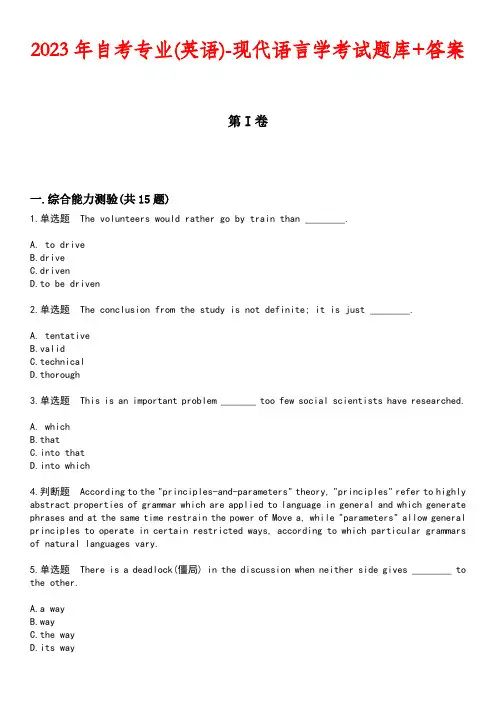
2023年自考专业(英语)-现代语言学考试题库+答案第I卷一.综合能力测验(共15题)1.单选题 The volunteers would rather go by train than ________.A. to driveB.driveC.drivenD.to be driven2.单选题 The conclusion from the study is not definite; it is just ________.A. tentativeB.validC.technicalD.thorough3.单选题 This is an important problem _______ too few social scientists have researched.A. whichB.thatC.into thatD.into which4.判断题 According to the "principles-and-parameters" theory, "principles" refer to highly abstract properties of grammar which are applied to language in general and which generate phrases and at the same time restrain the power of Move a, while "parameters" allow general principles to operate in certain restricted ways, according to which particular grammars of natural languages vary.5.单选题 There is a deadlock(僵局) in the discussion when neither side gives ________ to the other.A.a wayB.wayC.the way6.单选题 Children have a natural ________ about the world around them.A. certaintyB.capabilityC.clevernessD.curiosity7.判断题 Linguists can concentrate on all the aspects of language at once.8.单选题 Country life is better than city life ________ it offers fresh air and noiseless environmentA. in thatB.as thatC.as forD.in which9.判断题 Searle's classification of illocutionary acts is based on the classification of performative verbs.10.单选题 ______ of a sentence depends on the context in which the sentence is uttered.A.Sentence meaningB.Utterance meaningC.The referenceD.The meaning11.判断题 A compound is the combination of only two words.12.判断题 Research findings have shown that language processing centers are situated ina single area of the left hemisphere.13.单选题 The other timing system belongs in our internal clocks,which,left ________,would tie the body to a 25-hour rhythm.A.behindB.aloneC.outD.aside14.单选题 The basic unit in the study of morphology is ______.A. the internal structureB.morphemeC.the rules by which words are formedD.wordA. being seenB.seeingC.him seeingD.seeing him第II卷一.综合能力测验(共15题)1.单选题 Younger children are curious ________ how things work ,and many of them want to take apart everything within their reach.A.ofB.aboutC.atD.with2.判断题 Well-arranged sentences are considered grammatical sentences that are formed following a set of syntactic rules.3.单选题 _______ is a fact that English is being accepted as an international language.A. ThereB.ThisC.ThatD.It4.判断题 In classifying the English consonants and vowels, the same criteria can be applied.5.单选题 It was a small place then compared to _______ it is now.A. whatB.whichC.littleD.few6.单选题 Lying under the skull, the human brain contains an average of ten billion nerve cells called ______.A.nerve fibersB.nervesC.neurons7.单选题 Bloomfield drew on ______ psychology when trying to define the meaning of linguistic forms.A.contextualB.conceptualistC.behavioristD.naming8.单选题 If you are walking away from a clock tower ,you will hear the ticking of the clock fade to a point ________ it cannot be heard.A. whichB.whatC.whereD.how9.单选题 The syntactic rules of any language are ______ in number.rgeB.smallC.finiteD.infinite10.单选题 Johnson was ________ unknown before running for the presidency.A. visiblyB.visuallyC.verticallyD.virtually11.单选题 By "language acquisition is primarily the acquistion of the grammatical system of language", linguists mean that ______.A.every specific rule allowed by the grammatical system of a language must be acquiredB.the phonological rules must be acquiredC.the syntactic rules must be acquiredD.the general principles that are fundamental to the grammaticality of speech must be acquired12.单选题―________ fine day it is today!A. How, suchB.What a, veryC.How, soD.What a, so13.单选题 If payment is not received, legal action will be our only ________.B.advantageC.alternativeD.ambition14.单选题 Weather _______, we ’ll go out for a walk.A. permittedB.permittingC.permitsD.for permitting15.单选题 I was writing a report last night; ________ I would not have stayed up late.A. howeverB.otherwiseC.thereforeD.furthermore第I卷参考答案一.综合能力测验1.正确答案:B本题解析:would rather 或 would sooner 的意思都是“宁愿” ,其后要求直接用动词原形。
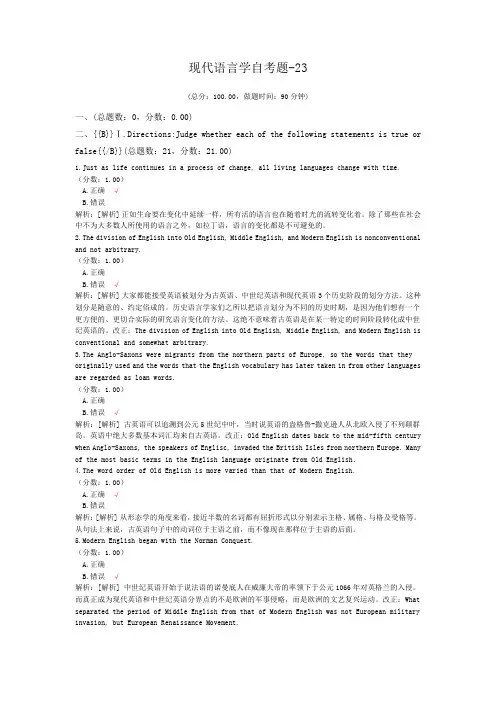
现代语言学自考题-23(总分:100.00,做题时间:90分钟)一、(总题数:0,分数:0.00)二、{{B}}Ⅰ.Directions:Judge whether each of the following statements is true or false{{/B}}(总题数:21,分数:21.00)1.Just as life continues in a process of change, all living languages change with time.(分数:1.00)A.正确√B.错误解析:[解析] 正如生命要在变化中延续一样,所有活的语言也在随着时光的流转变化着。
除了那些在社会中不为大多数人所使用的语言之外,如拉丁语,语言的变化都是不可避免的。
2.The division of English into Old English, Middle English, and Modern English is nonconventional and not arbitrary.(分数:1.00)A.正确B.错误√解析:[解析] 大家都能接受英语被划分为古英语、中世纪英语和现代英语3个历史阶段的划分方法。
这种划分是随意的、约定俗成的。
历史语言学家们之所以把语言划分为不同的历史时期,是因为他们想有一个更方便的、更切合实际的研究语言变化的方法。
这绝不意味着古英语是在某一特定的时间阶段转化成中世纪英语的。
改正:The division of English into Old English, Middle English, and Modern English is conventional and somewhat arbitrary.3.The Anglo-Saxons were migrants from the northern parts of Europe, so the words that they originally used and the words that the English vocabulary has later taken in from other languages are regarded as loan words.(分数:1.00)A.正确B.错误√解析:[解析] 古英语可以追溯到公元5世纪中叶,当时说英语的盎格鲁-撒克逊人从北欧入侵了不列颠群岛。
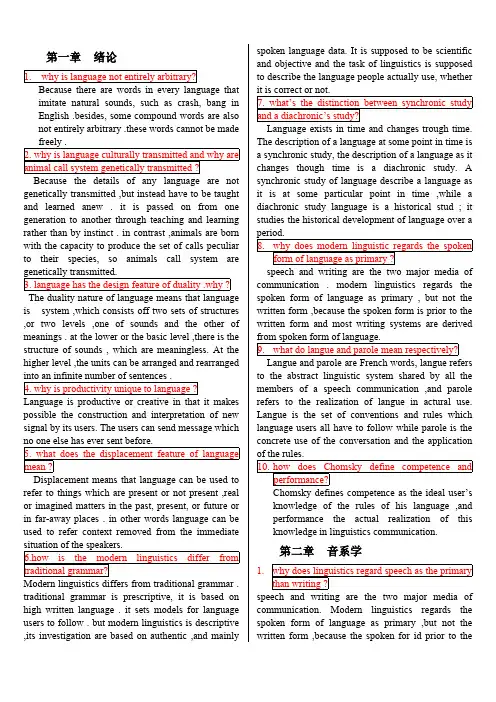
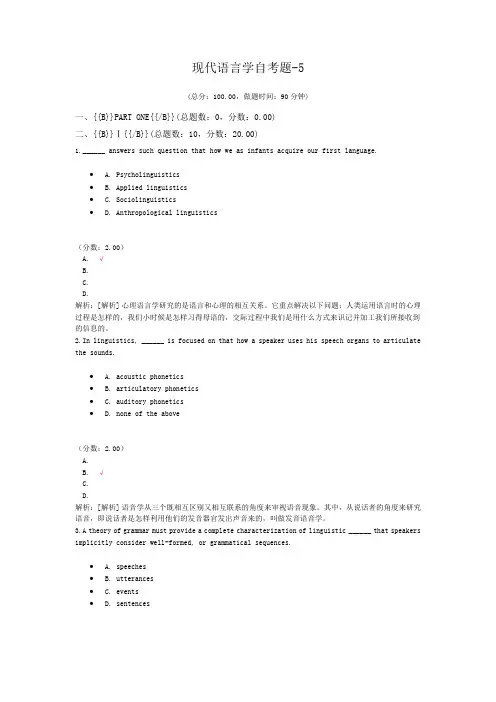
现代语言学自考题-5(总分:100.00,做题时间:90分钟)一、{{B}}PART ONE{{/B}}(总题数:0,分数:0.00)二、{{B}}Ⅰ{{/B}}(总题数:10,分数:20.00)1.______ answers such question that how we as infants acquire our first language.∙ A. Psycholinguistics∙ B. Applied linguistics∙ C. Sociolinguistics∙ D. Anthropological linguistics(分数:2.00)A. √B.C.D.解析:[解析] 心理语言学研究的是语言和心理的相互关系。
它重点解决以下问题:人类运用语言时的心理过程是怎样的,我们小时候是怎样习得母语的,交际过程中我们是用什么方式来识记并加工我们所接收到的信息的。
2.In linguistics, ______ is focused on that how a speaker uses his speech organs to articulate the sounds.∙ A. acoustic phonetics∙ B. articulatory phonetics∙ C. auditory phonetics∙ D. none of the above(分数:2.00)A.B. √C.D.解析:[解析] 语音学从三个既相互区别又相互联系的角度来审视语音现象。
其中,从说话者的角度来研究语音,即说话者是怎样利用他们的发音器官发出声音来的,叫做发音语音学。
3.A theory of grammar must provide a complete characterization of linguistic ______ that speakers implicitly consider well-formed, or grammatical sequences.∙ A. speeches∙ B. utterances∙ C. events∙ D. sentences(分数:2.00)A.B. √C.D.解析:[解析] 句法规则在所有人类语言中都普遍存在,这些规则包括讲某种语言的人内在的语言知识体系,这种语言知识体系被称作语言能力。
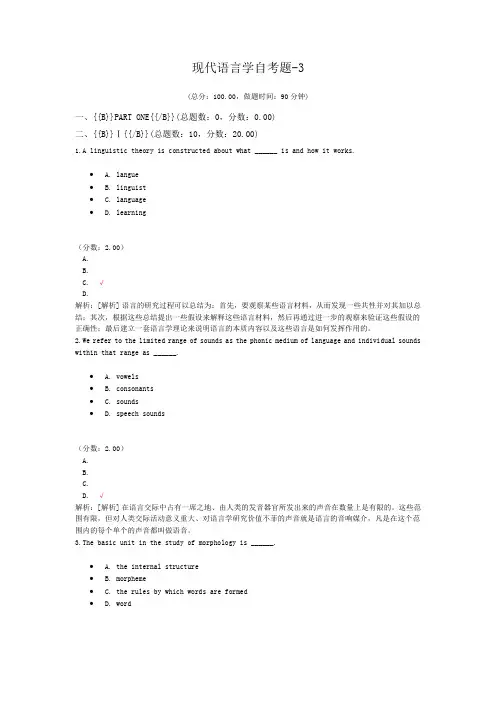
现代语言学自考题-3(总分:100.00,做题时间:90分钟)一、{{B}}PART ONE{{/B}}(总题数:0,分数:0.00)二、{{B}}Ⅰ{{/B}}(总题数:10,分数:20.00)1.A linguistic theory is constructed about what ______ is and how it works.∙ A. langue∙ B. linguist∙ C. language∙ D. learning(分数:2.00)A.B.C. √D.解析:[解析] 语言的研究过程可以总结为:首先,要观察某些语言材料,从而发现一些共性并对其加以总结;其次,根据这些总结提出一些假设来解释这些语言材料,然后再通过进一步的观察来验证这些假设的正确性;最后建立一套语言学理论来说明语言的本质内容以及这些语言是如何发挥作用的。
2.We refer to the limited range of sounds as the phonic medium of language and individual sounds within that range as ______.∙ A. vowels∙ B. consonants∙ C. sounds∙ D. speech sounds(分数:2.00)A.B.C.D. √解析:[解析] 在语言交际中占有一席之地、由人类的发音器官所发出来的声音在数量上是有限的。
这些范围有限,但对人类交际活动意义重大、对语言学研究价值不菲的声音就是语言的音响媒介,凡是在这个范围内的每个单个的声音都叫做语音。
3.The basic unit in the study of morphology is ______.∙ A. the internal structure∙ B. morpheme∙ C. the rules by which words are formed∙ D. word(分数:2.00)A.B. √C.D.解析:[解析] 正如音位是音系学研究中的基本单位一样,词素是形态学研究中的基本单位。
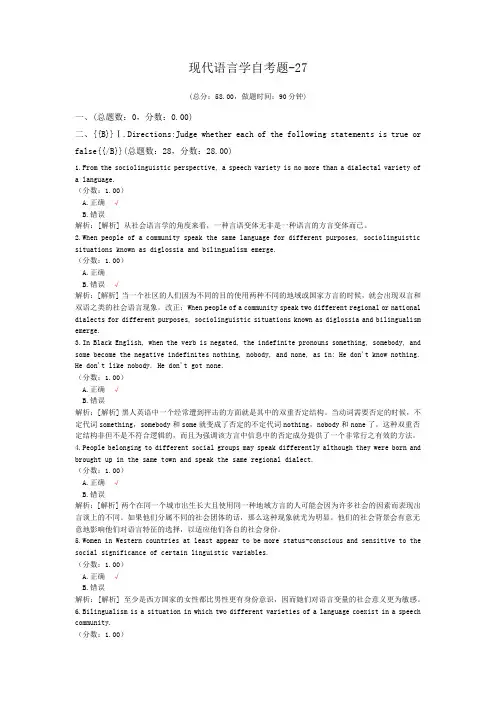
现代语言学自考题-27(总分:58.00,做题时间:90分钟)一、(总题数:0,分数:0.00)二、{{B}}Ⅰ.Directions:Judge whether each of the following statements is true or false{{/B}}(总题数:28,分数:28.00)1.From the sociolinguistic perspective, a speech variety is no more than a dialectal variety ofa language.(分数:1.00)A.正确√B.错误解析:[解析] 从社会语言学的角度来看,一种言语变体无非是一种语言的方言变体而已。
2.When people of a community speak the same language for different purposes, sociolinguistic situations known as diglossia and bilingualism emerge.(分数:1.00)A.正确B.错误√解析:[解析] 当一个社区的人们因为不同的目的使用两种不同的地域或国家方言的时候,就会出现双言和双语之类的社会语言现象。
改正:When people of a community speak two different regional or national dialects for different purposes, sociolinguistic situations known as diglossia and bilingualism emerge.3.In Black English, when the verb is negated, the indefinite pronouns something, somebody, and some become the negative indefinites nothing, nobody, and none, as in: He don't know nothing. He don't like nobody. He don't got none.(分数:1.00)A.正确√B.错误解析:[解析] 黑人英语中一个经常遭到抨击的方面就是其中的双重否定结构。
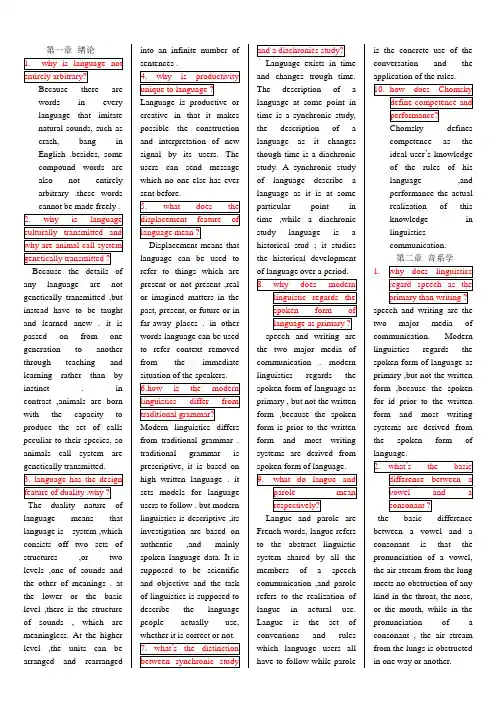
第一章 绪论Because there are words in every language that imitate natural sounds, such as crash, bang in English .besides, some compound words are also not entirely arbitrary .these words cannot be made freely .Because the details of any language are not genetically transmitted ,but instead have to be taught and learned anew . it is passed on from one generation to another through teachingand learning rather than by instinct . in contrast ,animals are born with the capacity to produce the set of calls peculiar to their species, so animals call system are genetically transmitted. The duality nature of language means that language is system ,which consists off two sets of structures ,or two levels ,one of sounds and the other of meanings . at the lower or thebasic level ,there is the structure of sounds , which are meaningless. At the higherlevel ,the units can be arranged and rearranged into an infinite number of sentences .Language is productive or creative in that it makes possible the construction and interpretationof new signal by its users. The users can send message which no one else has ever sent before. Displacement means that language can be used to refer to things which are present or not present ,real or imagined matters in the past, present, or future or in far-awayplaces . in other words language can be used to refer context removed from the immediate situation of the speakers. Modern linguistics differs from traditional grammar . traditional grammar is prescriptive, it is based on high written language . it sets models for language users to follow . but modern linguistics is descriptive ,its investigation are based on authentic ,and mainly spoken language data. It is supposed to be scientific andobjective and the task of linguistics is supposed to describe the language people actually use, whether it is correct or not. Language exists in time and changes trough time. The description of a language at some point in time is a synchronic study, the description of a language as it changes though time is a diachronic study. A synchronic study of language describe a language as it is at some particular point in time ,while a diachronic study language is a historical stud ; it studies the historical development of language over a period.speech and writing are the two major media of communication . modern linguistics regards the spoken form of language as primary , but not the written form ,because thespoken form is prior to the written form and most writing systems are derived from spoken form of language. Langue and parole are French words, langue refers to the abstract linguistic system shared by all the members of a speech communication ,and parole refers to the realization of langue in actural use. Langue is the set ofconventions and rules which language users all have to follow while parole is the concrete use of the conversation and the application of the rules. Chomsky defines competence as the ideal user ’s knowledge of the rules of his language,and performance the actual realization of this knowledge in linguisticscommunication. 第二章 音系学1. speech and writing are the two major media of communication. Modern linguistics regards the spoken form of language as primary ,but not the written form ,because the spoken for id prior to the written form and most writing systems are derived from the spoken form of language.the basic difference between a vowel and a consonant is that the pronunciation of a vowel,the air stream from the lung meets no obstruction of any kind in the throat, the nose, or the mouth, while in the pronunciation of a consonant , the air stream from the lungs is obstructed in one way or another.Which allophone is to be used is determined by the phonetic context in which it occurs. But the choice of an allophone is not random or haphazard in most cases; it is rule-governed . one of the tasks of the phonologist is to find out these rules.The phonemic features that occur above the level of the segments are called suprasegmental phonemes; these are the phonological properties of such units as the syllable , the word ,and the sentence. The main suprasegmental featuresinclude stress, tone, and intonation.第三章 形态学Morphology is divided into sub-branches : inflectional morphology and lexical or derivational morphology. Free morphemes are themorphemes which are independent units of meaning and can be used freely all by themselves or in combination with other morphemes .bound morphemes are the morphemes which cannot be used independently but have to be combinedwith other morphemes, either free or bound ,to form a word.derivational affixes are added to an exciting form to create a word . prefixes occur at the beginning of a word and. Prefixes modify the meaning of he stem .suffixes are added to the end of the stems ;they modifythe meaning of the original word and in many cases change its part of speech.Syntactically, the part of speech of the compound is generally determined by the part of speech o the second element, e.g. icy-cold adj. head —strong adv. Greenhouse n. but there are many exception ,especially with hose compounds ending with a verb or an adverb or a preposition . for example,follow up , crackdown ,kickoff are allnouns instead of adverbs.and toothpick, snowfall,and facelift arenoun instead of verbs.semantically, the meaning of a compound is often idiomatic, not always being the sum total of the meaning of its components. For example ,a greenhouse is not a house that is green .in order to find out the meaning of a compound, one sometimes hasto consult the dictionary instead of doing some guess work.第四章 句法学 As a major component of grammar, syntax consists of a set o abstract rules that allow words to be combined with other words to form grammatical sentences. A sentences is considered grammatical when it is in agreement with thegrammatical knowledge in the mind of native speakers. Universally found in the grammars of all human language ,syntactic rules comprise the system of internalized linguistic knowledge of a language speaker known as linguistic competence.Linguistics is generally defined as the scientific study of language. The word language in this definition implies that linguistics studies not any particular language ,but investigate or examine. And the word scientific refers to the way in which language is studied.Chomsky thinks that linguistics should study the ideal speaker ’s competence, but not his performance. For any natural language ,a set of syntactic rules are capable of yielding an endless number of sentences in that language .that is ,the syntactic rules of any language are finite in number, and yet there is no limit to the number of sentences native speakers of that language are able to produce and comprehend.Traditionally, there are three major types of sentences. They are simple sentence,coordinate sentence,and complex sentences.When a sentence is uttered or written down ,the words of the sentences are produced one after another in a sequence. Meanwhile,they are heard or read as arranged one after another in a sequence.therfore, the structure of a sentence is linear.major lexical categories are open categories in the sense that new words are constantly added. Minor lexical categories are closed categories becausethe number of lexical items in this categories is fixed and no new members are allowed for.The combinational pattern in a linear formula may be called a phrase structural rule. Syntactic movement is governed by transformational rules. The operation of the transformational rules may chang the syntactic representation of a sentence.parameters are syntactic options of UG that allow general principles to operate in one way or another and contribute to significant linguistics variation between and among natural language. Another parameter, the one that involves word order, concerns the directionality of case assignment ,i.e the directionality parameter. This parameter offers a neat and consist account forthe typological difference in the word order within the VP category between English and Japanese第五章 语义学Contextualism is based on the presumption that one can derive meaning from or reduce meaning to observable contexts. Two kinds of contest are recognized :the situational context and the Linguistic context.Obviously, linguistic forms with the same sense may have different references in different situation. For example, in the following exchange, the two speakers are surely talking about two different references, i.e. two different gogs.But because of their differentorigin ,there are often subtle differences between thesesynonyms .synonyms that are mutually substitutable under all circumstances are called complete synonyms . however, complete synonyms are rare.Dialectal synonyms which are used in different regional dialects .stylistic synonyms which differ in style. Synonyms hat siffer in their emotive or evaluation meaning collocational synonymssemantically different synonyms.A polysemic word i.e. a word with several meanings, is the result of the evolution of the primary meaning o the word ,the various meaning of the word are related to some degree ,as is discussed in the previous section.There is one advantage of componential analysis . by specifying the semantic features of certain words I will be possible to show how these words are related in meaning.there are three kinds. they are gradable antonyms,complementary antonyms and relational opposites. 第六章语用学Without this shared knowledge, linguistics communication would be impossible, and without considering this knowledge , linguistics communication cannot satisfactorily accounted for in apragmatic sense.If we regard a sentence as what people actually utter in the course of communication , it becomes an utterance ,and it should be considered in the situation in which it is actually uttered.Therefore ,while themeaning of a sentence is abstract ,and decontextualized, the meaning of an utterance is concrete ,and context-dependent. the act theory is the act of uttering words, phrases ,clauses. It is the ac of conveying literal meaning by meaning of syntax, lexicon and phonology.第七章 历史语言学Researches in historical linguistics shed light on prehistoric development in the evolution of language and the connections of earlier and later variants ofthe same language ,andprovide valuable insights into the kinship patterns of difference languages.it is generally accepted that the history of the English language is divided into the period of old English ,middle English and modern English.3.The most vigorous and no-going change in the historical development of a language is the change in its vocabulary.They are the Indo-European Family, The Sino-Tibetan Family, the Austronesian Family ,and the Afroasiatic Family.Grimm ’s major contribution to historical is his explanation of the relationships among cognates in terms of a sound shift, the systematic modification of a series of phonemes.Language do not change without reasons . a linguistics change is caused either by the inherent nature of language , or by external contacts of speakers of one language with the speakers of the other language.第八章 社会语言学Sociolinguistics is the study of language in social contexts. Sociolinguistics are also concern with the influence of extralinguistic factors on language use, such as age, gender, profession, and social statue.Sociolinguistics is the study of language in social contexts . in view of language as a primary means of communication among individual speakers of a society , sociolinguists are concerned with he social significance of language variation and languageuse indifferent speech communities including regional ,ethnic and social groups . sociolinguists are also concerned with the influence of extralinguistic factors on language use, such as age, gender,profession ,and social statue.The important characteristic of a speech community is that the members of the group must ,in some reasonable way, interact linguistically with other members of the community .they may share closely related language varieties, as wellas attitudes towards linguistic norms.they are regional dialects ,sociolects or social dialects ,and registers.第九章 心理语言学psycholinguistics is the study of language in relation to the mind. As the term suggests, psycholinguistics is viewed as the intersection of psychology and linguistics, drawing equally upon the language we acquire, produce and comprehend.By mean of dichotic listening tests, we can analyze the characteristic of incoming stimuli processed by the individual hemispheres.3. I has been proposed that the brain activity involved in hearing , understanding andthen saying a word would follow a definite pattern. 4.A safe conclusion from Genie ’s case for the moment is that the labguage faculty of an average human degenerates after the critical period and consequently ,most linguistic skills cannot develop.The most provocative position to date on the relationship between language and thought has been what is known as the Sapir-Whorf hypothesis.第十章 语言习得the study of language acquisition enables linguistics ,psychologists and applied linguists to better understand the nature of human language and the developmental processes oflanguage acquisition.The biological, ornativist, view of language acquisition means that human are equipped with the neural prerequisites for language and language use. 3.In principle ,no human brain can store all the words and expressions of a language . what happens is that when processing the language the hear ,children construct the grammar and make sense of the expression according to the grammar . when producing utterances, they follow the internalizedgrammatical rules.Starting from the prelinguistic cooing and babbling stage ,children move through the one-word ,two-word and multiword stage ,gradually acquiringphonology ,morphology, syntax, vocabulary, semantics, and discourse skills of the adult language system as they grow.Although SLA is not entirely different from FLA.some problems experienced in L2development by teenage or adult learners simply donot exist in children ’s L1. According toKrashen ,acquisition refersto the gradual and subconscious development of ability in the first language by using it naturally in daily communicativesituation .learning ,however,is defined as a conscous process of accumulating knowledge of a second language usually obtained in school settings.It has been claimed that the optimum age for SLA is early teenage.。
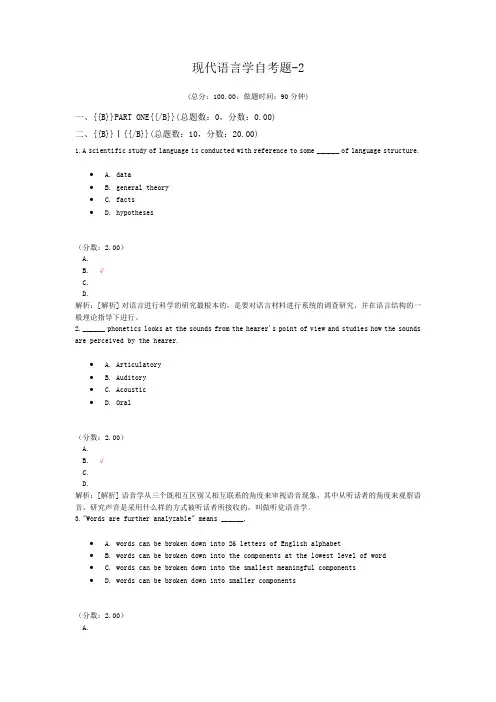
现代语言学自考题-2(总分:100.00,做题时间:90分钟)一、{{B}}PART ONE{{/B}}(总题数:0,分数:0.00)二、{{B}}Ⅰ{{/B}}(总题数:10,分数:20.00)1.A scientific study of language is conducted with reference to some ______ of language structure.∙ A. data∙ B. general theory∙ C. facts∙ D. hypotheses(分数:2.00)A.B. √C.D.解析:[解析] 对语言进行科学的研究最根本的,是要对语言材料进行系统的调查研究,并在语言结构的一般理论指导下进行。
2.______ phonetics looks at the sounds from the hearer's point of view and studies how the sounds are perceived by the hearer.∙ A. Articulatory∙ B. Auditory∙ C. Acoustic∙ D. Oral(分数:2.00)A.B. √C.D.解析:[解析] 语音学从三个既相互区别又相互联系的角度来审视语音现象,其中从听话者的角度来观察语音,研究声音是采用什么样的方式被听话者所接收的,叫做听觉语音学。
3."Words are further analyzable" means ______.∙ A. words can be broken down into 26 letters of English alphabet∙ B. words can be broken down into the components at the lowest level of word∙ C. words can be broken down into the smallest meaningful components∙ D. words can be broken down into smaller components(分数:2.00)A.B.C. √D.解析:[解析] 鉴于句子总是包含着并且经常被分析成单词的形式,所以单词一般被认为是语言中最小的单位。
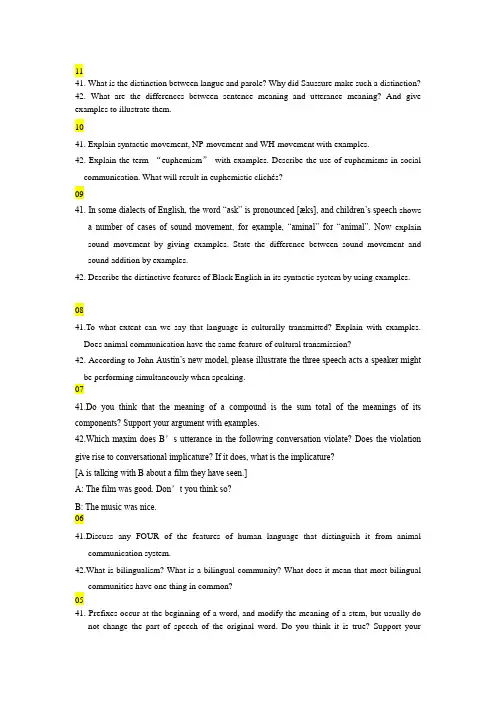
1141. What is the distinction between langue and parole? Why did Saussure make such a distinction?42. What are the differences between sentence meaning and utterance meaning? And give examples to illustrate them.1041. Explain syntactic movement, NP-movement and WH-movement with examples.42. Explain the term “euphemism”with examples. Describe the use of euphemisms in social communication. What will result in euphemistic clichés?0941. In some dialects of English, the word “ask” is pronounced [æks], and children’s speech showsa number of cases of sound movement, for example, “aminal” for “animal”. Now explainsound movement by giving examples. State the difference between sound movement and sound addition by examples.42. Describe the distinctive features of Black English in its syntactic system by using examples.0841.To what extent can we say that language is culturally transmitted? Explain with examples. Does animal communication have the same feature of cultural transmission?42. According to John Austin’s new model, please illustrate the three speech acts a speaker might be performing simultaneously when speaking.0741.Do you think that the meaning of a compound is the sum total of the meanings of its components? Support your argument with examples.42.Which maxim does B’s utterance in the following conversation violate? Does the violation give rise to conversational implicature? If it does, what is the implicature?[A is talking with B about a film they have seen.]A: The film was good. Don’t you think so?B: The music was nice.0641.Discuss any FOUR of the features of human language that distinguish it from animalcommunication system.42.What is bilingualism? What is a bilingual community? What does it mean that most bilingualcommunities have one thing in common?0541. Prefixes occur at the beginning of a word, and modify the meaning of a stem, but usually donot change the part of speech of the original word. Do you think it is true? Support youranswer with examples.42. What are the four maxims of the Cooperative Principle? Please give examples to show howthe flouting of these maxims gives rise to conversational implicature (Give at least two examples, each flouting a different maxim).05 0141. Under what conditions will two sounds be assigned to the same phoneme?42. For the following sentence, draw a tree diagram to reveal its underlying structure.The girl ate the orange.43. Study the passage taken from Shakespeare’s HAMLET below carefully and identify every difference in expression between Elizabethan and Modern English that is evident.King: Where is Polonius?Hamlet: In heaven, Send thither to see.If your messenger find him not there,seek him i’the other place yourself.But indeed, if you find him not withinthis month, you shall nose him as yougo up the stairs into the lobby.0441. The phonological features that occur above the level of individual sounds are calledsuprasegmental features. Discuss the main suprasegmental features, illustrating with examples how they function in the distinction of meaning.42. Explain and give examples to show in what way componential analysis is similar to the analysis of phonemes into distinctive features.0341. Explain sociological triggers for language change by giving a typical example in the history of English.42. Explain briefly the four main individual learner factors that affect a learner’s acquisition of a second language.0241.Explain with examples the three notions of phone, phoneme and allophone, and also how they are related.42.Explain what is sense and what is reference with examples.0141.In addition to revealing a linear order, a constituent structure tree has a hierarchical structure that groups words into structural constituents and shows the syntactic category of each structural constituent, and consequently is believed tomost truthfully illustrate the constituent relationship among linguistic elements.For example, the phrase " the old men and women" may have two interpretations,i.e.the adjective "old”may modify the noun "men", or the following two nouns "men andwomen".Linear order analysis cannot tell this difference, so it is ambiguous.Whereas,theconstituent or tree diagrams analysis can make this difference clear.So,we say tree diagrams are more advantageous and informative than linear structure analysis.NP NPNP NP NP NPThe old men and the women the old men and the old women42.From the perspective of psycholinguistic analysis,language use in terms ofperception,comprehension and production follows a certain pattern which involves the coordination of various language centers.When we speak,words are drawn from Wernicke's area and transferred to Broca's area, which determines the details of their form and pronunciation.The appropriate instructions are then sent to the motor area which controls the vocal tract to physically articulate the words.When we hear something and try to comprehend it,t he stimulus from the auditory cortex is transmitted to Wernicke's area,where it is then interpreted.When we perceive a visual image,a message is sent to the angular gyrus,where it is converted into a visual pattern.。
现代语言学自考题-7(总分:100.00,做题时间:90分钟)一、{{B}}PART ONE{{/B}}(总题数:0,分数:0.00)二、{{B}}Ⅰ{{/B}}(总题数:10,分数:20.00)1.Modern linguistics focuses on the present-day language, and it will be possible to describe language from a ______ point of view.∙ A. sociological∙ B. synchronic∙ C. diachronic∙ D. psychological(分数:2.00)A.B. √C.D.解析:[解析] 在现代语言学中,共时性研究比历时性研究更受人青睐。
其主要原因是,对一种语言不同时期的状况进行成功的研究之前,人们很难对它在历史变迁中所发生的变化进行描述。
人们一般把共时性的描述看做是对时下现存语言的描述,大多数的语言学研究皆属此类。
2.If you put a finger in each ear and say "z-z-z-z-z", you can feel the vibrations of the ______.∙ A. glottis∙ B. windpipe∙ C. larynx∙ D. vocal cords(分数:2.00)A.B.C.D. √解析:[解析] 当气流从肺部发出后,流经气管(windpipe),通向声门(glottis)。
声门是喉(larynx)的一部分,是位于气管尽头的软骨结构,这是声音从肺部发出后可能被改变的第一个部位。
横在声门之间的就是声带(vocal card)。
声门关闭时,中间只有一条窄缝,气流通过时引起声带振动,这种由于声带振动而发出的音叫做浊音。
英语中所有元间和一些辅音,如[b],[z],[m]等都是浊音。
现代语言学自考题-4(总分:100.00,做题时间:90分钟)一、{{B}}PART ONE{{/B}}(总题数:0,分数:0.00)二、{{B}}Ⅰ{{/B}}(总题数:10,分数:20.00)1.The study of language as a whole is often called ______ linguistics.∙ A. particular∙ B. general∙ C. ordinary∙ D. generative(分数:2.00)A.B. √C.D.解析:[解析] 把语言作为一个整体而进行的全面的语言学研究一般称为普通语言学。
2.Acoustic phoneticians try to describe the ______ properties of the stream of sounds which a speaker issues.∙ A. oral∙ B. mental∙ C. physical∙ D. recorded(分数:2.00)A.B.C. √D.解析:[解析] 语音学研究中,有一种方法是人们通过观察声音通过空气从一个人传给另一个人的物质手段——音波,来研究声音传导的方式,它叫做声学语音学。
3.In the word suitable, "______ able" is a morpheme.∙ A. derivational∙ B. inflectional∙ C. root∙ D. stem(分数:2.00)A. √B.D.解析:[解析] 英语中黏着词素分为词根和词缀。
词根有较清晰、确切的意思。
词缀分为屈折词缀(inflectional affixes)和派生词缀(derivational affixes)。
屈折词缀表示诸如数、时态等的语法关系。
很显然题干中-able并没有语法范畴含义,它只是加到suit后使其改变为形容词,所以它是派生词素。
2023年自考《现代语言学》复习题及答案2023年自考《现代语言学》复习题及答案一、单项选择1. Which of the following sounds is a voiceless bilabial stop?A. [p]B. [b]C. [m]D. [t]2. The great source of modification of the air stream is found in the ______ cavity.A. nasalB. oralC. lungD. glottis3. ______ act is the act performed by or resulting from saying something.A. A locutionaryB. An illocutionaryC. A perlocutionaryD. A speech4. Once the notion of ______ was taken into consideration, semantics spilled into pragmatics.A. meaningB. contextC. formD. content5. Sense is concerned with the ______ meaning of the linguistic form.A. contextualB. realC. behavioristD. inherent6. Hyponyms of the same ______ are co-hyponyms.A. wordB. lexical itemC. superordinateD. hyponym7. Words that are opposite in meaning are ______.A. synonymsB. hyponymsC. antonymsD. homophones8. The word “modernizers” is posed of _____ morphemes.A. 3B. 4C. 5D. 69. According to F. de Saussure, _____ refers to the abstract linguistic system shared by all the members of a speech munity.A. paroleB. performanceC. langueD. language10. Language is arbitrary in that there is no logical connection between meanings and ______.A. wordsB. soundsC. objectsD. ideasA. FreeB. BoundC. RootD. Affix12. The smallest meaningful unit of language is ______.A. rootB. affixC. stemD. morpheme13. _____ refers to a word or expression that is prohibited by the “polite” society from general use.A. Linguistic tabooB. EuphemismC. Address termD. Slang14. Lying under the skull, the human brain contains an average of the ten billion nerve cells called ______.A. neuronsB. nerve systemC. nervesD. cerebral cortex15. ______ language belongs to the Sino-Tibetan Family.A. EnglishB. SpanishC. IndianD. Chinese参考答案:1--- 5ABCBD 6---10CCBCB 11---15BDAAD二、名词解释 (每个2分,共20 分)1. Linguistics is generally defined as the scientific study of language.2. Morphology is a branch of grammar which studies the internal structure of words and the rules by which words are formed.3. Reference means what a linguistic form refersto in the real physical world; it deals with the relationship between the linguistic element and the non-linguistic world of experience.4. An illocutionary act is the act of expressing the speaker’s intent ion; it is the act performing is saying something.5. Speech munity is thus defined as a group of people who form a munity (which may have few membersas a family or as many members as a country), andshare the same language or a particular variety of language.6. Language is a system of arbitrary vocal symbols used for human munication.7. Inflectional affixes or inflectional morphemes manifest various grammatical relations or grammatical categories such as number, tense, degree, and case.8. Pragmatics is the study of how speakers of language use sentences to effect successful munication.9. Accent refers to a way of pronunciation which tells the listener something about the speaker’s regional or social background.10. A lingua franca is a variety of language that serves as a medium of munication among groups ofpeople from diverse linguistic backgrounds.三、简答题(每题5分,共20分)1. What is the distinction between petence and performance?petence and performance was proposed by the American linguist N. Chomsky in t he late 1950’s. Chomsky defines petence as the ideal user’s knowledge of the rules of his language, and performance the actual realization of this knowledge in linguistic munication.2. What are the sense relations between sentences?Sense relations between sentences:1) X is synonymous with Y.2) X is inconsistent with Y.3) X entails Y.(Y is an entailment of X.)4) X presupposes Y. (Y is a prerequisite of X)5) X is a contradiction.6) X is semantically anomalous.3. What is idiolect?When an individual speaks, what is actually produced is a unique language system of the speaker, expressed within the overall system of a particular language. Such a personal dialect is referred to as idiolect.4. What is the Sapir-Whorf hypothesis?四、阐述题(每题10分,共30分)1. What are the design features of language?Design features refer to the defining propertiesof human language that distinguish it from any animal system of munication.1) arbitrariness2) productivity3) duality4) displacement5) cultural transmission2. Draw a labeled constituent structure tree diagram for each of the following sentences:1) The student likes the new linguistics professor.2) John suggested Mary take the linguistics class.1. The student likes the new linguistics professor.2. John suggested (that) Mary take the linguistics class.3. What is the difference between acquisition and learning? Illustrate with exles.。
2021年自考《现代语言学》习题及答案Ⅰ.Multiple ChoiceDirections:Read each of the following statements carefully. Decide which one of the four choices best completes the statement and put the letter A,B,C or D in the brackets.(2%×10=20%)1.The pair of words “lend”and “borrow”are ___.( )A.gradableoppositesB.relationaloppositesC.co-hyponymsD.synonyms2.The discovery of Indo-European language family began with the work of the British scholar.( )A.Jacob GrimmB.Rasmus RaskC.Franz BoppD.Sir William Jones3.A linguist regards the changes in language and language use as __.( )A.unusualB.something to be fearedC.abnormalD.natural4.__produce fast and fluent speech with good intonation and pronunciation but the content of their speech ranges from mildly inappropriate to complete nonsense,often as unintelligible.( )A.Broca's aphasicB.The linguistic deprivationC.The damage on the angular gyrusD.Wernicke's aphasic5.Some Southern learners of English in China tend to say “night” as “light”.This shows: .( )A.They cannot pronounce/n/B.Interlangue interference because there is notthe sound /n/in their mother tongueC.The teachers do not have a good teaching methodD.They do not like to pronounce nasal sounds6.A word with several meanings is called __word.( )A.a polysemousB.a synonymousC.an abnormalD.a multiple7.The function of the sentence “A nice day, isn't it?”is __.( )rmativeB.phaticC.directiveD.performative8.The most recognizable differences between American English and British English are in __ and vocabulary.( )ageB.grammarC.pronunciationD.structure9.__deals with the way in which a language varies through geographical space.( )A.Linguisticgeography B.Lexicology C.Lexicography D.Sociolinguistics10.The semantic components of the word “gentleman” can be expressed as __.( )A.+animate,+male,+human,-adultB.+animate,+male,+human,+adultC.+animate,-male,+human,-adultD.+animate,-male,+human,+adultⅡ.Blank FillingDirections:Fill in the blank in each of the following statements with oneword,the first letter of which is already given as a clue.Note that you are to fill in ONE word only,and you are not allowed to change the letter given.(1%×10=10%)11.A sentence is a structurally independent unit that usually comprises a number of w________ to form a complete statement,q________or command.12.In sociolinguistic studies,speakers are treated as members of s__g________.13.Utterance is based on ________ ________ ;it is the realization of the abstract meaning of a sentence in a real situation of communication,or simply in a context.14.To many people,a linguist is the same as a ________,one who can speak several languages fluently.15.Consonant sounds can be either v ________or v__,while all vowel sounds are v________.Ⅲ.True of False questionDirections: Judge whether each of the following statements is true or false. Put a T for true or F for false in the brackets in front of each statement. I (2%×10=20%)16.All words may be said to contain a root morpheme.( )17.Tense and reference are two terms often encountered in the study ofmeaning.( )18.Linguistics is the course of language.( )19.The part of a sentence which compriese comprises an infinite verb ora verb phrase is grammatically called predicate.( )20.Historical linguistics equals to the study of synchronic study.( )21.The term dialect,as a technical term in linguistics,carries value judgement and not simply refers to a distinct form of language.( )22.Morphology is translated as 形态学。
自考英语语言学试题及答案一、选择题(每题2分,共20分)1. The study of language is known as:A. SociologyB. LinguisticsC. PsychologyD. Anthropology答案:B2. Which of the following is a branch of linguistics that deals with the structure of language?A. PhoneticsB. SyntaxC. SemanticsD. Pragmatics答案:B3. The smallest meaningful unit in a language is:A. PhonemeB. MorphemeC. SyllableD. Word答案:B4. The process of a language changing over time is called:A. Language acquisitionB. Language evolutionC. Language shiftD. Language decay答案:B5. In linguistics, what is the term for the study of the meaning of words in a sentence?A. SemanticsB. PhonologyC. SyntaxD. Pragmatics答案:A6. What is the name for the systematic use of variations in pitch, tone, and rhythm in spoken language?A. PhonologyB. IntonationC. AccentD. Dialect答案:B7. The study of language in relation to culture is known as:A. SociolinguisticsB. Anthropological linguisticsC. Cultural linguisticsD. Ethnolinguistics答案:A8. Which of the following is not a component of a phoneme?A. Voice onset timeB. Place of articulationC. Stress patternD. Manner of articulation答案:C9. The use of language in specific social situations is the focus of:A. PragmaticsB. SemanticsC. SyntaxD. Phonology答案:A10. What is the term for a group of words that form acomplete thought?A. ClauseB. PhraseC. SentenceD. Lexeme答案:C二、填空题(每题2分,共20分)11. The __________ is the systematic study of language sounds.答案:Phonetics12. In linguistics, the term __________ refers to the smallest unit of meaning in a language.答案:Morpheme13. The study of language in relation to the brain and cognitive processes is known as __________.答案:Neurolinguistics14. __________ is the branch of linguistics that deals with the structure of sentences.答案:Syntax15. A language that develops among a group of people who frequently communicate is known as a __________.答案:Dialect16. The study of language change over time is known as__________.答案:Diachronic linguistics17. The __________ is the study of the way language is used by a particular community or group.答案:Sociolinguistics18. The smallest unit of sound that can distinguish meaning is called a __________.答案:Phoneme19. The study of language universals, which are features common to all human languages, is known as __________.答案:Universal grammar20. The process of a child acquiring the ability to understand and use a language is called __________.答案:Language acquisition三、简答题(每题10分,共30分)21. Explain the difference between a dialect and a language.答案:A dialect is a variety of a language that is characterized by its specific phonological, grammatical, and lexical features, and is typically associated with a particular geographical region or social group. A language, on the other hand, is a complex and distinct system of communication used by a community of people, which may include multiple dialects. While dialects are mutually intelligible to some degree within a language community, languages are often not mutually intelligible and require translation.22. Describe the concept of language death.答案:Language death occurs when a language ceases to be spoken by a community and has no fluent speakers left. This can happen for various reasons, including the displacement of a community, the assimilation into a dominant culture, or the shift to a more widely used language for economic or social reasons. Language death can lead to a loss of cultural heritage and diversity, as languages are often closely tied to the identity and traditions of the communities that speak them.23. What is the Sapir-Whorf hypothesis, and what are its implications for linguistics?答案:The Sapir-Whorf hypothesis is the theory that the structure of a language determines the way its speakers perceive and conceptual。
现代语言学试题及答案一、选择题(每题2分,共20分)1. 现代语言学研究的核心是什么?A. 语言的起源B. 语言的演变C. 语言的规则D. 语言的功能答案:C2. 以下哪项不是语言学的分支?A. 语音学B. 语法学C. 心理学D. 语义学答案:C3. 语言学中的“phoneme”指的是什么?A. 音位B. 音素C. 音节D. 音标答案:A4. 下列哪个选项是“语言接触”的结果?A. 语言的消亡B. 语言的产生C. 语言的融合D. 语言的孤立答案:C5. 以下哪种语言现象不属于词汇变化?A. 合成B. 派生C. 借用D. 语音变化答案:D6. 语言学中的“transformational grammar”是什么?A. 转换语法B. 句法分析C. 语义分析D. 语音学答案:A7. 以下哪个术语与语言的“社会功能”无关?A. 语言的规范B. 语言的变异C. 语言的习得D. 语言的交际答案:C8. “语言的普遍语法”是哪位语言学家提出的?A. 费尔迪南·德·索绪尔B. 诺姆·乔姆斯基C. 爱德华·萨丕尔D. 威廉·冯·洪堡特答案:B9. 以下哪种语言现象不属于语用学研究范畴?A. 言语行为B. 语境分析C. 语音变化D. 隐喻答案:C10. “语言的相对性原则”是哪种语言理论的核心?A. 结构主义B. 形式主义C. 功能主义D. 心理语言学答案:A二、填空题(每题2分,共20分)1. 语言学的创始人是________。
答案:费尔迪南·德·索绪尔2. 语言学中,________是指语言的最小意义单位。
答案:语素3. 语言的________是指语言在特定社会环境中的使用。
答案:语境4. 语言学中的________是指语言的音韵结构。
答案:音韵学5. 语言的________是指语言的词汇和语法结构。
答案:形式6. 语言学中的________是指语言的规则系统。
第一章 绪论Because there are words in every language that imitate natural sounds, such as crash, bang in English .besides, some compound words are also not entirely arbitrary .these words cannot be made freely .Because the details of any language are not genetically transmitted ,but instead have to be taught and learned anew . it is passed on from one generation to another through teachingand learning rather than by instinct . in contrast ,animals are born with the capacity to produce the set of calls peculiar to their species, so animals call system are genetically transmitted. The duality nature of language means that language is system ,which consists off two sets of structures ,or two levels ,one of sounds and the other of meanings . at the lower or thebasic level ,there is the structure of sounds , which are meaningless. At the higherlevel ,the units can be arranged and rearranged into an infinite number of sentences .Language is productive or creative in that it makes possible the construction and interpretationof new signal by its users. The users can send message which no one else has ever sent before. Displacement means that language can be used to refer to things which are present or not present ,real or imagined matters in the past, present, or future or in far-awayplaces . in other words language can be used to refer context removed from the immediate situation of the speakers. Modern linguistics differs from traditional grammar . traditional grammar is prescriptive, it is based on high written language . it sets models for language users to follow . but modern linguistics is descriptive ,its investigation are based on authentic ,and mainly spoken language data. It is supposed to be scientific andobjective and the task of linguistics is supposed to describe the language people actually use, whether it is correct or not. Language exists in time and changes trough time. The description of a language at some point in time is a synchronic study, the description of a language as it changes though time is a diachronic study. A synchronic study of language describe a language as it is at some particular point in time ,while a diachronic study language is a historical stud ; it studies the historical development of language over a period.speech and writing are the two major media of communication . modern linguistics regards the spoken form of language as primary , but not the written form ,because thespoken form is prior to the written form and most writing systems are derived from spoken form of language. Langue and parole are French words, langue refers to the abstract linguistic system shared by all the members of a speech communication ,and parole refers to the realization of langue in actural use. Langue is the set ofconventions and rules which language users all have to follow while parole is the concrete use of the conversation and the application of the rules. Chomsky defines competence as the ideal user ’s knowledge of the rules of his language,and performance the actual realization of this knowledge in linguisticscommunication. 第二章 音系学1. speech and writing are the two major media of communication. Modern linguistics regards the spoken form of language as primary ,but not the written form ,because the spoken for id prior to the written form and most writing systems are derived from the spoken form of language.the basic difference between a vowel and a consonant is that the pronunciation of a vowel,the air stream from the lung meets no obstruction of any kind in the throat, the nose, or the mouth, while in the pronunciation of a consonant , the air stream from the lungs is obstructed in one way or another.Which allophone is to be used is determined by the phonetic context in which it occurs. But the choice of an allophone is not random or haphazard in most cases; it is rule-governed . one of the tasks of the phonologist is to find out these rules.The phonemic features that occur above the level of the segments are called suprasegmental phonemes; these are the phonological properties of such units as the syllable , the word ,and the sentence. The main suprasegmental featuresinclude stress, tone, and intonation.第三章 形态学Morphology is divided into sub-branches : inflectional morphology and lexical or derivational morphology. Free morphemes are themorphemes which are independent units of meaning and can be used freely all by themselves or in combination with other morphemes .bound morphemes are the morphemes which cannot be used independently but have to be combinedwith other morphemes, either free or bound ,to form a word.derivational affixes are added to an exciting form to create a word . prefixes occur at the beginning of a word and. Prefixes modify the meaning of he stem .suffixes are added to the end of the stems ;they modifythe meaning of the original word and in many cases change its part of speech.Syntactically, the part of speech of the compound is generally determined by the part of speech o the second element, e.g. icy-cold adj. head —strong adv. Greenhouse n. but there are many exception ,especially with hose compounds ending with a verb or an adverb or a preposition . for example,follow up , crackdown ,kickoff are allnouns instead of adverbs.and toothpick, snowfall,and facelift arenoun instead of verbs.semantically, the meaning of a compound is often idiomatic, not always being the sum total of the meaning of its components. For example ,a greenhouse is not a house that is green .in order to find out the meaning of a compound, one sometimes hasto consult the dictionary instead of doing some guess work.第四章 句法学 As a major component of grammar, syntax consists of a set o abstract rules that allow words to be combined with other words to form grammatical sentences. A sentences is considered grammatical when it is in agreement with thegrammatical knowledge in the mind of native speakers. Universally found in the grammars of all human language ,syntactic rules comprise the system of internalized linguistic knowledge of a language speaker known as linguistic competence.Linguistics is generally defined as the scientific study of language. The word language in this definition implies that linguistics studies not any particular language ,but investigate or examine. And the word scientific refers to the way in which language is studied.Chomsky thinks that linguistics should study the ideal speaker ’s competence, but not his performance. For any natural language ,a set of syntactic rules are capable of yielding an endless number of sentences in that language .that is ,the syntactic rules of any language are finite in number, and yet there is no limit to the number of sentences native speakers of that language are able to produce and comprehend.Traditionally, there are three major types of sentences. They are simple sentence,coordinate sentence,and complex sentences.When a sentence is uttered or written down ,the words of the sentences are produced one after another in a sequence. Meanwhile,they are heard or read as arranged one after another in a sequence.therfore, the structure of a sentence is linear.major lexical categories are open categories in the sense that new words are constantly added. Minor lexical categories are closed categories becausethe number of lexical items in this categories is fixed and no new members are allowed for.The combinational pattern in a linear formula may be called a phrase structural rule. Syntactic movement is governed by transformational rules. The operation of the transformational rules may chang the syntactic representation of a sentence.parameters are syntactic options of UG that allow general principles to operate in one way or another and contribute to significant linguistics variation between and among natural language. Another parameter, the one that involves word order, concerns the directionality of case assignment ,i.e the directionality parameter. This parameter offers a neat and consist account forthe typological difference in the word order within the VP category between English and Japanese第五章 语义学Contextualism is based on the presumption that one can derive meaning from or reduce meaning to observable contexts. Two kinds of contest are recognized :the situational context and the Linguistic context.Obviously, linguistic forms with the same sense may have different references in different situation. For example, in the following exchange, the two speakers are surely talking about two different references, i.e. two different gogs.But because of their differentorigin ,there are often subtle differences between thesesynonyms .synonyms that are mutually substitutable under all circumstances are called complete synonyms . however, complete synonyms are rare.Dialectal synonyms which are used in different regional dialects .stylistic synonyms which differ in style. Synonyms hat siffer in their emotive or evaluation meaning collocational synonymssemantically different synonyms.A polysemic word i.e. a word with several meanings, is the result of the evolution of the primary meaning o the word ,the various meaning of the word are related to some degree ,as is discussed in the previous section.There is one advantage of componential analysis . by specifying the semantic features of certain words I will be possible to show how these words are related in meaning.there are three kinds. they are gradable antonyms,complementary antonyms and relational opposites. 第六章语用学Without this shared knowledge, linguistics communication would be impossible, and without considering this knowledge , linguistics communication cannot satisfactorily accounted for in apragmatic sense.If we regard a sentence as what people actually utter in the course of communication , it becomes an utterance ,and it should be considered in the situation in which it is actually uttered.Therefore ,while themeaning of a sentence is abstract ,and decontextualized, the meaning of an utterance is concrete ,and context-dependent. the act theory is the act of uttering words, phrases ,clauses. It is the ac of conveying literal meaning by meaning of syntax, lexicon and phonology.第七章 历史语言学Researches in historical linguistics shed light on prehistoric development in the evolution of language and the connections of earlier and later variants ofthe same language ,andprovide valuable insights into the kinship patterns of difference languages.it is generally accepted that the history of the English language is divided into the period of old English ,middle English and modern English.3.The most vigorous and no-going change in the historical development of a language is the change in its vocabulary.They are the Indo-European Family, The Sino-Tibetan Family, the Austronesian Family ,and the Afroasiatic Family.Grimm ’s major contribution to historical is his explanation of the relationships among cognates in terms of a sound shift, the systematic modification of a series of phonemes.Language do not change without reasons . a linguistics change is caused either by the inherent nature of language , or by external contacts of speakers of one language with the speakers of the other language.第八章 社会语言学Sociolinguistics is the study of language in social contexts. Sociolinguistics are also concern with the influence of extralinguistic factors on language use, such as age, gender, profession, and social statue.Sociolinguistics is the study of language in social contexts . in view of language as a primary means of communication among individual speakers of a society , sociolinguists are concerned with he social significance of language variation and languageuse indifferent speech communities including regional ,ethnic and social groups . sociolinguists are also concerned with the influence of extralinguistic factors on language use, such as age, gender,profession ,and social statue.The important characteristic of a speech community is that the members of the group must ,in some reasonable way, interact linguistically with other members of the community .they may share closely related language varieties, as wellas attitudes towards linguistic norms.they are regional dialects ,sociolects or social dialects ,and registers.第九章 心理语言学psycholinguistics is the study of language in relation to the mind. As the term suggests, psycholinguistics is viewed as the intersection of psychology and linguistics, drawing equally upon the language we acquire, produce and comprehend.By mean of dichotic listening tests, we can analyze the characteristic of incoming stimuli processed by the individual hemispheres.3. I has been proposed that the brain activity involved in hearing , understanding andthen saying a word would follow a definite pattern. 4.A safe conclusion from Genie ’s case for the moment is that the labguage faculty of an average human degenerates after the critical period and consequently ,most linguistic skills cannot develop.The most provocative position to date on the relationship between language and thought has been what is known as the Sapir-Whorf hypothesis.第十章 语言习得the study of language acquisition enables linguistics ,psychologists and applied linguists to better understand the nature of human language and the developmental processes oflanguage acquisition.The biological, ornativist, view of language acquisition means that human are equipped with the neural prerequisites for language and language use. 3.In principle ,no human brain can store all the words and expressions of a language . what happens is that when processing the language the hear ,children construct the grammar and make sense of the expression according to the grammar . when producing utterances, they follow the internalizedgrammatical rules.Starting from the prelinguistic cooing and babbling stage ,children move through the one-word ,two-word and multiword stage ,gradually acquiringphonology ,morphology, syntax, vocabulary, semantics, and discourse skills of the adult language system as they grow.Although SLA is not entirely different from FLA.some problems experienced in L2development by teenage or adult learners simply donot exist in children ’s L1. According toKrashen ,acquisition refersto the gradual and subconscious development of ability in the first language by using it naturally in daily communicativesituation .learning ,however,is defined as a conscous process of accumulating knowledge of a second language usually obtained in school settings.It has been claimed that the optimum age for SLA is early teenage.。